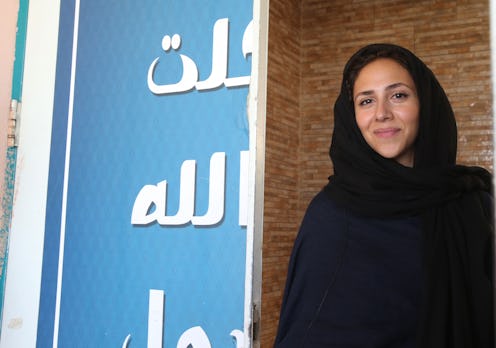News
Saudi Arabian Women Win Big, Still Have Work Ahead
The number that news outlets have been reporting is varied, but possibly up to 17 Saudi Arabian women made history Friday, Reuters reported, as they won seats on local municipal councils during Saudi Arabia's first gender inclusive election. Notoriously one of the most oppressive countries in the world in terms of women's rights, Saudi Arabia is making an important effort to modernize and include women in government. But while these recent elections seem like a huge win, there's one big reason it's just not enough.
The late King Abdullah, who died in January, was instrumental in the country's recent push for modernization. In January 2013, King Abdullah issued a royal decree that mandated one-fifth of the seats on the country's top advisory council must be filled by women, and he ensured that women would be able to vote in Friday's election without a male guardian's permission. Now, several women across the country's 13 districts will be lending their voice to politics for the very first time.
As monumental as these elections are, Saudi Arabia still has a long way to go — the local council positions that the women were elected to ultimately don't have that much power to accomplish change. According to Reuters, the positions that the women achieved are on municipal councils that do not have lawmaking abilities. It is a huge step forward from women being unable to vote, much less actually win an election, but further representation at a higher level of government will be the next, much more meaningful step. More parity in the Shura advisory council could bring needed change, and having women on the king's direct advisory Council of Ministers is the logical next goal.
Women in government in Saudi Arabia are especially important because they may be able to provide a more liberal interpretation of Islamic law. Saudi Arabia has traditionally prohibited women from driving, leaving their house without a male escort, and even punishing rape victims, but the hope is that women will be able to bring incremental changes to the conservative society. "[The elections] will bring a female point of view, demanding certain amendments to laws that are unfavourable towards women," said Muna Abusulayman, a Saudi entrepreneur.
However, equality can stagnate even after suffrage is achieved. Hattie Caraway was the first U.S. female senator, elected in 1931, but it wasn't until 2010 that the Senate reached the one-fifth ratio that Saudi Arabia just instituted. Laws must change, but the root of misogynistic culture has to change as well. If women aren't culturally respected, they will not be elected into government equally, even if it is legally allowed.
Of course, not everyone wants those changes. The country's Grand Mufti, the most senior religious figure, said that allowing women in politics is "opening the door to evil." There is much still to be accomplished in Saudi Arabia to see real gender equality, but these changes are the beginning of a new era in the country and a new world of possibility for Saudi women.
